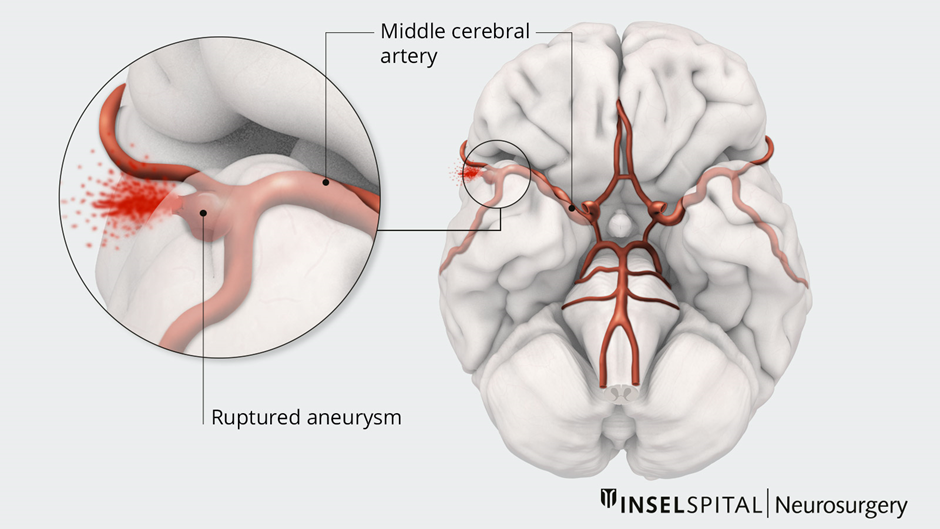A nurse is caring for a client who has chronic migraine headaches. The client asks the nurse if it could be a cerebral aneurysm. Which of the follow responses should the nurse use?
"If you have a cerebral aneurysm, you would be having seizures."
"If you have a cerebral aneurysm, you will experience nausea and vomiting."
"If you had a cerebral aneurysm, you would have a stiff neck."
"If you have a cerebral aneurysm, you typically will have no symptoms."
The Correct Answer is D
"If you have a cerebral aneurysm, you would be having seizures. “is incorrect because not all cerebral aneurysms cause seizures. Seizures may occur if the aneurysm ruptures and causes bleeding into the brain, but they are not a universal symptom of an unruptured cerebral aneurysm.
Choice B Reason:
"If you have a cerebral aneurysm, you will experience nausea and vomiting. “is incorrect because while headaches, nausea, and vomiting can occur with a ruptured cerebral aneurysm (subarachnoid hemorrhage), they are not necessarily present in all cases, especially with unruptured aneurysms.
Choice C Reason:
"If you had a cerebral aneurysm, you would have a stiff neck." is incorrect because a stiff neck (meningeal irritation) is typically associated with subarachnoid hemorrhage from a ruptured cerebral aneurysm, but it is not always present and is not a definitive symptom of an unruptured aneurysm.
Choice D Reason:
"If you have a cerebral aneurysm, you typically will have no symptoms." Cerebral aneurysms can vary greatly in terms of their presentation and symptoms. While some aneurysms may cause symptoms such as headaches, nausea, vomiting, seizures, or a stiff neck, many cerebral aneurysms are asymptomatic and go unnoticed until they rupture or are incidentally discovered during imaging studies for other reasons.
Nursing Test Bank
Naxlex Comprehensive Predictor Exams
Related Questions
Correct Answer is B
Explanation
Choice A Reason:
Keeping lights turned to medium level in the evening is incorrect. This intervention is aimed at reducing environmental stimuli, which may be appropriate for some patients with neurological conditions to minimize sensory overload and promote rest. However, it is not a specific intervention for preventing cerebral aneurysm rupture.
Choice B Reason:
Maintaining the head of the bed between 30 and 45° is correct. Keeping the head of the bed elevated can help reduce intracranial pressure and decrease the risk of cerebral aneurysm rupture or rebleeding in patients with aneurysmal subarachnoid hemorrhage. This position promotes venous drainage from the brain and helps prevent increases in intracranial pressure.
Choice C Reason:
Administering hypotonic intravenous solutions is incorrect. Hypotonic intravenous solutions have a lower osmolarity than blood plasma and can lead to cerebral edema, which may exacerbate intracranial pressure and increase the risk of cerebral aneurysm rupture. Isotonic solutions, such as normal saline (0.9% NaCl) or lactated Ringer's solution, are typically preferred for fluid resuscitation and maintenance in patients at risk of cerebral aneurysm rupture.
Choice D Reason:
Reposition the client every shift is incorrect. Repositioning the client every shift helps prevent complications associated with immobility, such as pressure ulcers, pneumonia, and venous thromboembolism. While important for overall patient care, repositioning alone does not directly address the risk of cerebral aneurysm rupture.

Correct Answer is ["A","B","E"]
Explanation
Choice A Reason:
Encouraging the client to walk regularly is appropriate. Regular exercise, including walking, can help improve mobility, balance, and overall physical function in individuals with Parkinson's disease. It can also help alleviate symptoms such as stiffness and tremors.
Choice B Reason:
Providing the client with fresh fruits and vegetables is appropriate. A healthy diet rich in fresh fruits and vegetables provides essential nutrients, antioxidants, and fiber, which can support overall health and well-being. While diet alone does not directly treat Parkinson's disease, maintaining a nutritious diet is important for overall health.
Choice C Reason:
Restricting fluids to 800 mL/day is inappropriate. Fluid restriction is not typically indicated for individuals with Parkinson's disease unless they have a specific medical condition such as heart failure or kidney disease, which may require fluid restriction as part of their management plan. Restricting fluids excessively can lead to dehydration, which can worsen symptoms such as fatigue, confusion, and constipation, common in Parkinson's disease. Adequate hydration is important for overall health and well-being, including maintaining proper kidney function and preventing urinary tract infections, which individuals with Parkinson's disease may be susceptible to due to urinary retention issues.
Choice D Reason:
Minimizing exposure to outside activities is inappropriate. While it's important for individuals with Parkinson's disease to take precautions to avoid falls and injuries, completely restricting exposure to outside activities is not necessary or advisable. Physical activity, social engagement, and exposure to sunlight are beneficial for both physical and mental health. Encouraging individuals with Parkinson's disease to remain engaged in activities they enjoy, with appropriate safety measures in place, can help maintain their quality of life and overall well-being.
Choice E Reason:
Teaching the client how to use a walker is inappropriate. Assistive devices such as walkers can help individuals with Parkinson's disease maintain mobility and independence, especially if they experience gait disturbances or balance problems. Teaching the client how to use a walker safely and effectively can enhance their quality of life and reduce the risk of falls.
Whether you are a student looking to ace your exams or a practicing nurse seeking to enhance your expertise , our nursing education contents will empower you with the confidence and competence to make a difference in the lives of patients and become a respected leader in the healthcare field.
Visit Naxlex, invest in your future and unlock endless possibilities with our unparalleled nursing education contents today
Report Wrong Answer on the Current Question
Do you disagree with the answer? If yes, what is your expected answer? Explain.
Kindly be descriptive with the issue you are facing.
